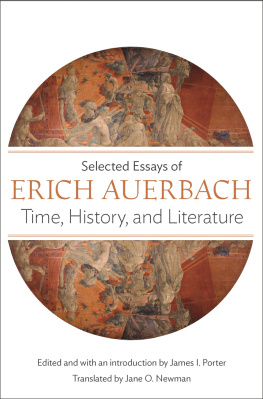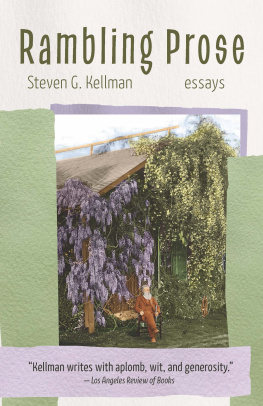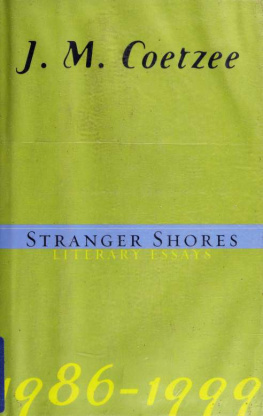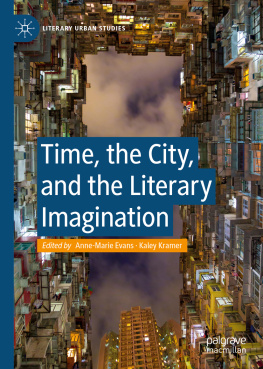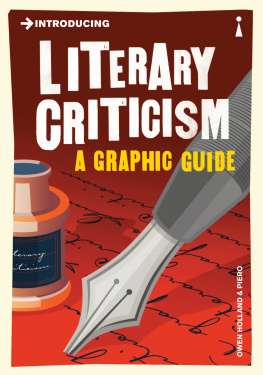Time, History, and Literature
Time, History, and Literature
Selected Essays of Erich Auerbach
Edited and with an introduction by James I. Porter
Translated by Jane O. Newman
PRINCETON UNIVERSITY PRESS
Princeton & Oxford
Copyright 2014 by Princeton University Press
Published by Princeton University Press, 41 William Street, Princeton, New Jersey 08540 In the United Kingdom: Princeton University Press, 6 Oxford Street,
Woodstock, Oxfordshire OX20 1TR
press.princeton.edu
COVER ART: Paolo Uccello (13971475), The Great Flood, S. Maria Novella, Florence, Italy. Photo: George Tatge for Alinari, 1998. Courtesy of Alinari / Art Resource, NY
All Rights Reserved
Second printing, and first paperback printing, 2016
Paperback ISBN: 978-0-691-16907-1
The Library of Congress has cataloged the cloth edition as follows
Auerbach, Erich, 18921957.
Time, history, and literature : selected essays of Erich Auerbach / edited and with an introduction by James I. Porter ; translated by Jane O. Newman.
pages cm
Includes bibliographical references and index.
ISBN 978-0-691-13711-7 (acid-free paper) 1. LiteratureHistory and criticismTheory, etc. 2. CriticsGermany. 3. CriticismGermany. 4. Literary historiansGermany. I. Porter, James I., 1954 editor of compilation. II. Newman, Jane O., translator. III. Title.
PN504.A94 2014
809dc23 2013013528
eISBN: 978-0-691-23452-6
R0
ACKNOWLEDGMENTS
James I. Porter
This collection arose out of a discrepancy that struck me as I grew increasingly interested in the writings and career of the Romance philologist Erich Auerbach. Despite his recognition as one of the great literary critics of the twentieth century, a large portion of his essays were going uncited, and apparently also unreadwith palpable consequences for the way Auerbachs image has been shaped since the translation of Mimesis in 1953, his best read work in the anglophone world, but by no means his only work.
Auerbachs output was considerable, and it took numerous forms, including essays, many of which have been unavailable in English until now. I am extremely grateful to Princeton University Press for responding without hesitation to my proposal to put together a new edition of Auerbachs most significant essays. First and foremost, I wish to thank Hanne Winarsky, who gave this project its initial momentum. I am further grateful to Brigitta van Rheinberg, Alison MacKeen, Larissa Klein, and Kathleen Cioffi, all of whom made my communications with the Press as pleasurable and efficient an experience as one could hope for. Jane Newman brought Auerbachs prose to life in English. Without her dedication (and patience with my various editorial intrusions) this collection would not have seen the light of day. Thanks also go to Eva Jaunzems for her expert copyediting. Kevin Batton built the index. The project has benefited from a number of helping hands besides, some of whom are listed in the acknowledgments to my introduction below, and others in my other published essays on Auerbach. Among the greatest of my debts are those I owe to Martin Vialon, whose contributions to this volume are too many to name, and not easily repaid.
Note: All translations from the German are by Jane O. Newman, with the exception of Chapter 9 (On the Anniversary Celebration of Dante), which was translated by James I. Porter.
INTRODUCTION
James I. Porter
What we are we have become in the course of our history, and it is only in history that we can remain what we are, and develop.
Auerbach, The Philology of World Literature
Frequently credited with having shaped the modern study of comparative literature, and famous above all for his daring study, Mimesis: The Representation of Reality in Western Literature (German original 1946; English translation 1953), Erich Auerbach has been the beneficiary of a surge of attention from literary and cultural critics in the humanities over the past two decades, above all in Germany and in the United States. It is therefore an opportune moment to produce a new selection of his essays, many of which have never been available in English, and so continue to go unappreciated even by those who are most concerned to reassess Auerbachs life and circumstances.
Quite apart from their obvious evidentiary value (they span the full length of his career), the essays in this collection have an indisputable immediate value. All of them are gems. None is very long or forbiddingly learned, apart from two (Figura, here Chapter 7, and Passio as Passion, here Chapter 14). And taken as an ensemble, they permit us to observe Auerbach responding to a variety of occasions in a wide range of venues, from a feuilleton piece commemorating the six-hundredth anniversary of Dantes death in 1921 to his inaugural postdoctoral lecture at Marburg (July 1929) to a talk recorded after the War (March 1948) at the Pennsylvania State College (now Pennsylvania State University) to the obligatory run of articles produced for academic journals and edited volumesthough Auerbach always wears his learning lightly and is never dry or pedantic: he tends to use footnotes, the weapon of choice for German scholars, in a sparing fashion, and even quotations from originals are kept to a minimum. On the other hand, what Auerbach forgoes in academic niceties he makes up for in radical impulses: he is constantly challenging his colleagues in Romance philology and in nearby fields to press their disciplines towards ever broader and more searching limits. Finally, underlying all of his writings is a deep intellectual coherence that is as admirable as it is rare. Auerbach has the potential to inspire readers even today. Students in the humanities would do well to emulate his example.
Auerbachs Life and Afterlife
Erich Auerbach (18921957) was caught in the crosshairs of history. A German-Jewish intellectual who fought for his country in the First World War and was decorated with an Iron Cross (2nd class), Auerbach was removed from his teaching post in Marburg and effectively forced into exile by the Nazis in 1935 in the wake of the racially discriminatory Nuremberg Laws of that same year. The laws, which banned Jews from public employment on the basis of bloodlines while imposing a host of further stigmas and restrictions, effectively annuled the rather fragile immunity Auerbach had enjoyed since 1933. At that time, an earlier law was passed that spared Jewish and some non-Jewish but politically suspect veterans from being removed from their posts in the civil service (others were less fortunatefor example, Auerbachs colleague, Leo Spitzer [18871960]). Unsafe in Germany, he sat out the Second World War in Istanbul and later emigrated to the States in 1947 to live out the last decade of his life as an minence grise in the American academyfirst at the Pennsylvania State College, then briefly at the Institute for Advanced Studies in Princeton (194950), and finally at Yale where he held a professorship and then a chair in Romance philology until his death. Some half a century on, Erich Auerbach is now being reexamined and celebrated, whether as a founder of comparative literature, an example of the exilic intellectual, or as a prophet of global literary studies.
Despite all this attention, the Auerbach who has been received to date and made into a canonical figure that looms larger than life remains a somewhat filtered version of himself. The Auerbach who is most familiar today is defined by a certain time period: he is the scholar who fled Germany and who wrote under duress in impoverished conditions (most memorably, but least significantly, without a research library) and then later reflected on this tumultuous era, the Auerbach of Figura (1938),

